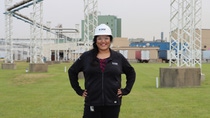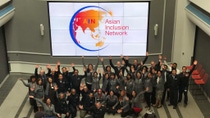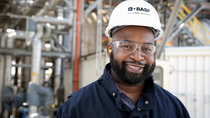Media
Building rapport through commonality: Shabnam Ahmed

Born and raised in the suburbs of Chicago, Shabnam is a first-generation Bangladeshi American. Despite initially wanting to become a math teacher, she decided to follow in her father’s footsteps and become a chemical engineer. She graduated from the University of Illinois at Urbana-Champaign in 2012.
Her professional career led her to different cities around the country and in 2016, she joined BASF. Since then, she has transitioned from operations to her current position, Manufacturing Technology Leader, which combines her creativity, passion for problem-solving, and ability to connect with others.
Learn more about Shabnam’s story, her exciting and challenging position and her efforts to build a culture of inclusion inside the manufacturing environment at BASF, making it an even better place to work.
Finding a place to belong
As a chemical engineering graduate, Shabnam was looking for experience, and the manufacturing industry felt like a natural fit for her skills. After a few years in other companies, she joined BASF and started working in the West Memphis, Arkansas site and eventually moved to Wyandotte, Michigan, where she currently resides. The transition into different states was a challenging one.
“Professionally, it’s not ideal to change several things at the same time. Like, the job location, business unit and position. And I changed all of those at once. Even though I was still touching the manufacturing space, it was more isolating, which was hard because I have extroverted tendencies. It’s also difficult to meet people in some locations where everyone already knows each other,” she explains.
One of the ways she found support and community was through BASF’s Employee Resource Groups, particularly the Asian Inclusion Network (AIN).
Shabnam with colleagues Ed Sucharski and Randy Reinhold in BASF's Wyandotte, Michigan site.
She got involved in AIN and became more engaged with the social aspect of the company. In her words, “It was a difficult transition. It took time, but I feel confident now that this is where I belong.”
Closing the gap between strategy and daily operations
In her current position as Manufacturing Technology Leader, Shabnam oversees and supports two plastic manufacturing sites in Mexico and two in the U.S., and acts as a liaison between the sites and the business, supporting capital planning, continuous improvement and technology. Essentially, “whatever the business needs, digitalization, sustainability, etc., I roll out the initiative in a way that makes sense for each site. As far as site needs, typically related to resources, I advocate for the sites by preparing business case and project justifications to convey the needs upwards,” she remarks.
This natural progression from her former position in operations allows Shabnam to continue to support operators, echo their needs and make their lives easier, while also considering the needs of the business and articulating the strategy in a way that makes sense to both parties, without compromising safety.
At the same time, by working with several sites and having regular exchanges, Shabnam can help identify potential opportunities for collaboration, adopt solutions from one specific site and apply them to another, and explore areas of improvement for all the sites that she supports.
Safety is a clear priority in her line of work. “Although we have our ongoing safety moments, long-term preventative assessments are necessary and I'm in a really good position to be proactive. Safety is also always at the forefront when it comes to technology. I'm able to use what I understand and what I see from the sites to make it more prominent and tangible. We all need to return home from work the same way we arrived,” she explains.
Sustainability is also key in her decision-making process and one that moves the entire company. Sustainability is generally associated with efficiencies, CO2 emissions reduction, circular economy, green energy, etc., but Shabnam also thinks of sustainability as making changes that can be maintained over time. “I am passionate about effective change. Effective, long-term, lasting change. That’s a big part of how I view sustainability.”
She’s worked on a number of impactful projects related to both aspects of sustainability. Most recently, she was part of a team that led the efforts to build a new lab at the Altamira, Mexico site. Previously, the site hired an external party to manage its quality testing, but as part of the operational excellence program, testing was brought in-house, saving the company an average of $250,000 a year.
Building a more inclusive culture
Feeling part of a community that drives change and inclusion is a key motivator in Shabnam’s life and work. Since transitioning to Wyandotte in 2019, she has had a very active social role, mainly through the Asian Inclusion Network, an Employee Resource Group (ERG) focused on bringing together various Asian cultures into one community, providing networking, training and exchange opportunities, of which she is currently co-chair.

10-year anniversary celebration of the Asian Inclusion Network.
“I was very eager to get involved as much as I could, wherever I could. I signed up at the ERG fair for everything, every event and volunteer opportunity possible. The experience has been really enriching. It has provided an extended family, a powerful network, and I love it. I've really evolved and changed as a leader,” Shabnam explains.
In her efforts to continue growing and affecting change within the organization, Shabnam took part in the Female Leaders Advancing Manufacturing Excellence (FLAME) Lighting the Way program in 2022, where she connected with several female leaders across BASF. Sponsored by BASF’s Manufacturing Community Steering Committee (MCSC), FLAME was developed to help BASF meet its target of having 30% of leadership roles held by women by 2030.
Later that year, she joined BASF’s MCSC Diversity, Equity & Inclusion Steering Team as the team lead for Inclusive Culture in manufacturing. “The ultimate goal is to address the gap of underrepresented minorities in leadership positions. So that's kind of our target statement goal. I was brought in to provide my perspective, and now I'm leading the inclusive culture team,” she expands.
Fostering an inclusive culture means providing each employee with equitable access to opportunities and resources. However, understanding how to be more inclusive can be challenging, especially because, as she notes, “culture is something you feel, you can’t easily measure it.”
This feeling can be affected by the smallest things, such as constantly having to inform of your dietary restrictions for meetings or missing out on opportunities because they are celebrated on religious dates that are not company holidays or occur in locations not accessible to all. “When it comes to building an inclusive culture, we're looking at large scale initiatives like bringing ERGs to frontline workers, but overall, there are ways the company can be more intentional with small things to make people feel they are valued and that they belong. I am thrilled to be involved with creating the types of opportunities that I wish I had more of in my career.”
There is still room to grow and improve, she recognizes, but what moves Shabnam to continue working towards these goals is the fact that “BASF values people and it’s a safe space to really harness and harbor that reality. Even in a large company, you feel worthy.”
Published on July 10, 2023, by Mariana Licio.
For media inquiries or to repurpose this article, please contact Lisa Brown.
